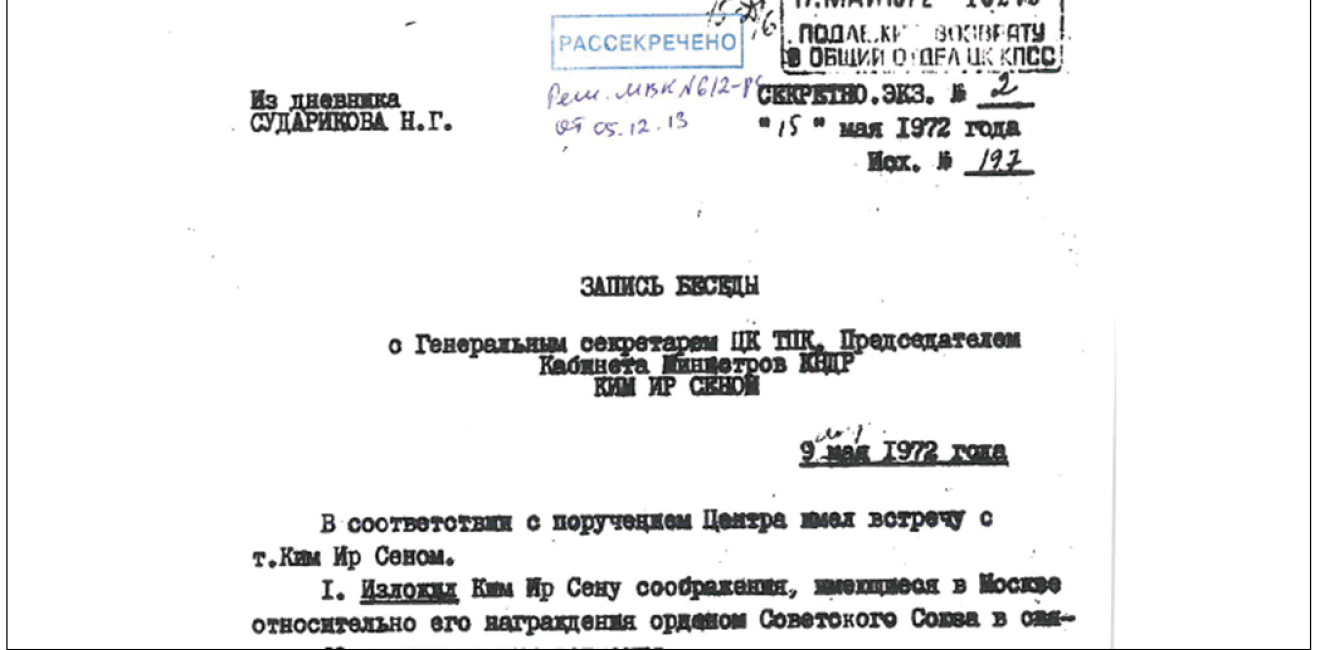North Korean Views on Inter-Korean Relations, 1972
Soviet documents from 1972 provide insights into Kim Il Sung's views of South Korea, the North Korean economy, and relations with the USSR and the PRC.

A blog of the History and Public Policy Program
Soviet documents from 1972 provide insights into Kim Il Sung's views of South Korea, the North Korean economy, and relations with the USSR and the PRC.

The North Korea International Documentation Project has just published nine new translations from the Russian State Archive of Contemporary History (RGANI). The documents, all from 1972, include the transcripts of five conversations between Kim Il Sung and Soviet leaders.
The sources are particularly valuable for understanding the unexpected rise and precipitous fall of the dialogue between North and South Korea. Several of the documents were utilized by Sergey Radchenko and Bernd Schaefer in their 2017 article that appeared in Cold War History, “‘Red on White’: Kim Il Sung, Park Chung Hee, and the Failure of Korea’s Reunification, 1971-1973.”
In a May 15 talk, Kim opined on the possibilities for Korean reunification. He sensed an opportunity to aggravate civil-military relations in South Korea and sow political discord, due to the proclamation of a state of emergency by Seoul. But, in a more conciliatory statement, Kim also remarked that if Park Chung Hee satisfied a number of the North’s demands (including the withdrawal of American troops), “then we are ready to hold talks with him.”
In meetings on June 19 and 28, Kim described the Red Cross talks then taking place between representatives from North and South Korea. He also revealed that he was conducting secret communications with the Park government in order to feel out the South’s position on higher-level talks concerning reunification. Kim shared various insights that he gleaned from the secret channel, among them the following statement: “on the basis of the unofficial contacts we have come to the conclusion that Park Chung Hee is more afraid of his people than of us.”
The next conversations with Kim, dated October and November 1972, came several months after the July 4th Joint Statement between North and South Korea and the high-level meetings between leaders from both countries.
In both the October and November meetings with Soviet officials, Kim described his waning enthusiasm for the inter-Korean dialogue after the July highpoint, due to perceived missteps and blunders by South Korea. He offered an overview of the talks between his envoy, Yun Gi-bok, and the head of South Korea’s CIA, Lee Hu-rak, and pinpointed various moments where he believed the talks had gone awry.
Aside from the revelations about inter-Korean relations, Kim’s conversations (and the other documents released) are also valuable for understanding the North Korean economy and the DPRK’s relations with China and the Soviet Union in the early 1970s.
Although Kim sometimes boasted about the positive economic situation in the DPRK, in his 1972 talks he was usually quite candid about poverty in his country and asked often about gaining more Soviet assistance. Explaining why Soviet such aid was so essential, Kim remarked, “in conditions of the ensuing peaceful contacts with the South we are setting a goal of a rapid increase of the population's standard of living with the purpose of more clearly showing the advantages of socialism.”
The documents also show a certain obsession by the Soviet Union in monitoring and seeking to influence North Korea’s relationship with the People’s Republic of China. One report described the need for an “active” and “long-term” policy of “impeding” China’s relations with the DPRK.
Source: RGANI, f. 5, op. 64, d. 423, ll. 6-14. Contributed by Sergey Radchenko and translated by Gary Goldberg.
Kim Il Sung credits the diplomatic achievements and economic development of North Korea for creating greater opposition and chaos in South Korea. He also broaches how the two Koreas have different opinions on family reunions.
Source: RGANI, f. 5, op. 64, d. 423, ll. 20-32. Contributed by Sergey Radchenko and translated by Gary Goldberg.
Novikov and Kim Il Sung discuss the DPRK’s trade and economy, emphasizing the increasing cooperation among the socialist countries through the Council for Mutual Economic Assistance (Comecon). In addition, Kim Il Sung mentions that the North has secret contacts in South Korea in order to gain a better understanding of the internal situation in Seoul.
Source: RGANI, f. 5, op. 64, d. 423, ll. 33-37. Contributed by Sergey Radchenko and translated by Gary Goldberg.
Kim Il Sung expresses satisfaction toward Brezhnev’s positions regarding Korea and Vietnam, which were made during talks with U.S. President Nixon. Kim also criticizes Park Chung Hee for suppressing the opposition in South Korea, including the imprisonment of Kim Dae-jung.
Source: RGANI, f. 5, op. 64, d. 423, ll. 38-53. Contributed by Sergey Radchenko and translated by Gary Goldberg.
Kim Il Sung briefs Sudarikov on North Korea’s recent economic development, including the number of ongoing construction projects and the expansion of light industry enterprises. Kim also discusses the meeting between Yoon Ki-bok and Lee Hu-rak, and how North and South Korea are interested in establishing a coordinating committee.
Source: RGANI, f. 5, op. 64, d. 423, ll. 143-147. Contributed by Sergey Radchenko and translated by Gary Goldberg.
Kim Yong-nam explains the three principles for reunification, which were established at the North-South Joint Communique on the 4th of July in 1972, and blames South Korea in part for not following the spirit of the agreement.
Source: RGANI, f. 5, op. 64, d. 423, ll. 128-136. Contributed by Sergey Radchenko and translated by Gary Goldberg.
Kim Yong-nam insists that South Korea should be blamed for establishing an anti-communist policy, which violates the third principle of reunification. He also discusses the special declaration of Park Chung Hee, which was released on October 17, 1972.
Source: RGANI, f. 5, op. 64, d. 424, ll. 51-54. Contributed by Sergey Radchenko and translated by Gary Goldberg.
Kim Il discusses a recent meeting regarding “the interaction between South and North in the international arena,” held between Pak Seong-cheol and Lee Hu-rak on November 3-4, 1972.
Source: RGANI, f. 5, op. 64, d. 424, ll. 55-64. Contributed by Sergey Radchenko and translated by Gary Goldberg.
During the meeting between Lee Hu-rak and Pak Seong-cheol on November 2, North Korea asked the South to free political prisoners, cease its anti-communist campaigns, and restore democracy before a North-South Coordinating Committee is established. The structure and functions of the committee were discussed as well.
A. Putintsev and V. Gorovoy, 'Key Aspects of Korean-Chinese relations in 1972'
Source: RGANI, f. 5, op. 64, RGANI, f. 5, op. 64, d. 422, ll. 230-239. Contributed by Sergey Radchenko and translated by Gary Goldberg.
A letter from the Soviet Embassy in Pyongyang reviewing developments in Sino-North Korean relations in 1972, including the effects of China’s anti-Soviet campaigns and Beijing’s seeking of closer ties with the US and Japan.


A leader in making key foreign policy records accessible and fostering informed scholarship, analysis, and discussion on international affairs, past and present. Read more


The North Korea International Documentation Project serves as an informational clearinghouse on North Korea for the scholarly and policymaking communities, disseminating documents on the DPRK from its former communist allies that provide valuable insight into the actions and nature of the North Korean state. Read more


The Cold War International History Project supports the full and prompt release of historical materials by governments on all sides of the Cold War. Read more



